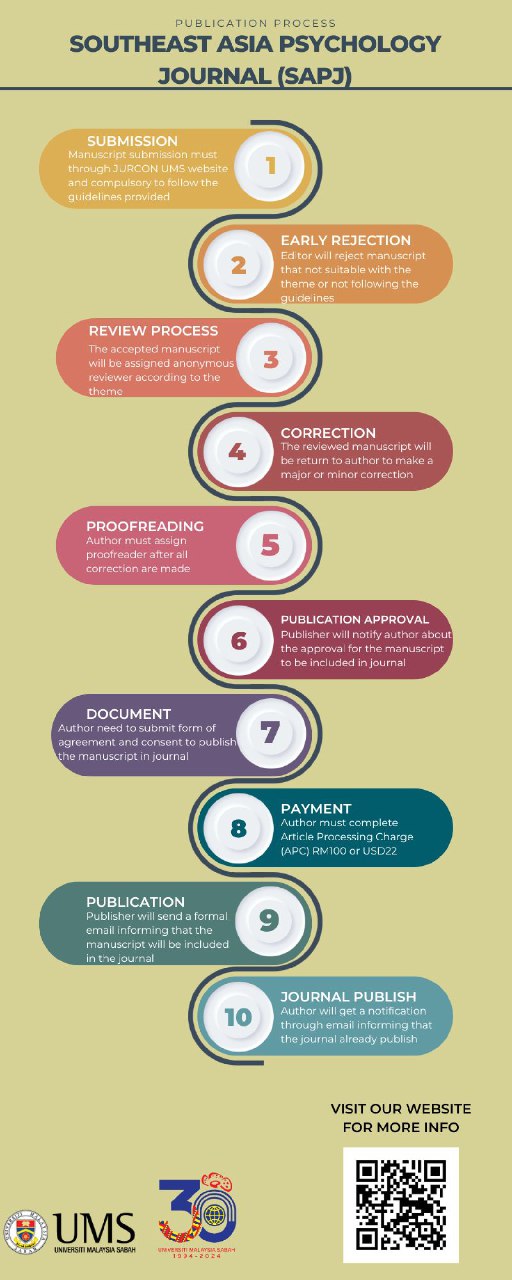THE RELATIONSHIP BETWEEN SELF-COMPASSION AND PSYCHOLOGICAL WELL-BEING AMONG UNDERGRADUATE STUDENTS IN USIM
DOI:
https://doi.org/10.51200/sapj.v12i2.5297Keywords:
Self-compassion, psychological well-being, university students, mental healthAbstract
Self-compassion is an area in positive psychology that has gained much interest among the public in recent years. It is frequently cited as a means for assisting individuals attain an enhanced and more balanced sense of psychological well-being. This study investigated the relationship between self-compassion and psychological well-being among undergraduate students at Universiti Sains Islam Malaysia. Employing the quantitative research method, it surveyed 153 respondents from six different programs at the Faculty of Leadership and Management, namely Counseling, Da’wah and Islamic Management, Akidah and Religion Studies, Communication, New Media Communications, and Management with Tourism. For data collection, the Self-Compassion Scale (SCS) measured self-compassion while 18 items from the Ryff’s Psychological Well-being (PWB) scale were used to measure the level of psychological well-being. The study findings show no significant differences in self-compassion and psychological well-being in both male and female students. The study also reported a significant correlation (r = 0.593, n =153, p < 0.05) between self-compassion and psychological well-being among the students, indicating a robust association between the two variables. This implies that greater psychological well-being among university students would require a higher sense of self-compassion. In conclusion, responsible parties such as the higher management levels of universities and academicians should be aware of the issues and implement appropriate planning initiatives aimed at enhancing the level of self-compassion and well-being among students.
References
Akhter, S. (2015). Psychological well-being in student of gender difference. The International Journal of Indian Psychology, 2(4), 153-161.
Allen, A.B., & Leary, M.R. (2010). Self-compassion, stress, and coping. Social and Personality Psychology Compass, 4(2), 107–118.
Ariyani, E.D., & Hadiani, D. (2019). Gender and students' self-compassion level. Soshum: Jurnal Sosial dan Humaniora, 9(3), 281-288.
Bennett-Goleman, T. (2001). Emotional alchemy: How the mind can heal the heart. New York:
Three Rivers Press.
Berryhill, M.B., Harless, C., & Kean, P. (2018). College student cohesive-flexible family functioning and mental health: Examining gender differences and the mediation effects of positive family communication and self-compassion. The Family Journal, 26(4), 422-432. https://doi.org/10.1177/1066480718807411
Bluth, K., Campo, R.A., Futch, W.S., & Gaylord, S.A. (2017). Age and gender differences in the associations of self-compassion and emotional well-being in a large adolescent sample. Journal of Youth and Adolescence, 46(4), 840-853. doi: 10.1007/s10964-016-0567-2
Brown, B. (1999). Soul without shame: A guide to liberating yourself from the judge within. Boston: Shambala.
Damon, W. (1995). Greater expectations: Overcoming the culture of indulgence in America’s homes and schools. New York: Free Press.
Gable, S.L., & Haidt, J. (2005). What (and why) is positive psychology? Review of General Psychology, 9(2), 103-110. https://doi.org/10.1037/1089-2680.9.2.103
Geng, Y., & He, L. (2021). Gender differences in children’s psychological well-being in Mainland China: Risk and protective factors. Applied Research in Quality of Life, 1-21. https://doi.org/10.1007/s11482-021-09986-8
Gómez-Baya, D., Lucia-Casademunt, A.M., & Salinas-Pérez, J.A. (2018). Gender differences in psychological well-being and health problems among European health professionals: Analysis of psychological basic needs and job satisfaction. International Journal of Environmental Research and Public Health, 15(7), 1474. doi: 10.3390/ijerph15071474
Hanh, T.N. (1997). Teachings on love. Berkeley, CA: Parallax Press.
Hill, J., & Lynch, M. (1983).The intensification of gender-related role expectations during early adolescence. In: Brooks-Gunn J, Petersen A, editors. Girls at Puberty. pp. 201–228.
Hollis-Walker, L., & Colosimo, K. (2011). Mindfulness, self-compassion, and happiness in non-meditators: A theoretical and empirical examination. Personality and Individual Differences,50(2), 222–227
Homan, K.J. (2016). Self-compassion and psychological well-being in older adults. Journal of Adult Development, 23(2), 111-119. DOI 10.1007/s10804-016-9227-8
Hyde J.S., Mezulis, A.H., Abramson, L.Y. (2008). The ABCs of depression: Integrating affective, biological, and cognitive models to explain the emergence of the gender difference in depression. Psychological Review. 115(2), 291.
Kotera, Y., & Ting, S.H. (2019). Positive psychology of Malaysian university students: Impacts of engagement, motivation, self-compassion, and well-being on mental health. International Journal of Mental Health and Addiction, 1-13. https://doi.org/10.1007/s11469-019-00169-z
Keyes, C.L. (2002). The mental health continuum: From languishing to flourishing in life. Journal of Health and Social Behavior, 207-222. DOI:10.2307/3090197
Khairani, A.Z., Shamsuddin, H., & Idris, I. (2019). Improving psychological well-being among undergraduates: How creativity in learning can contribute?. Jurnal Komunikasi: Malaysian Journal of Communication, 35(2). 346-360. https://doi.org/10.17576/JKMJC-2019-3502-21
Marsh, I.C., Chan, S.W., & MacBeth, A. (2018). Self-compassion and psychological distress in adolescents—a meta-analysis. Mindfulness, 9(4), 1011-1027. doi: 10.1007/s12671-017-0850-7
Matud, M.P., López-Curbelo, M., & Fortes, D. (2019). Gender and psychological well-being. International Journal of Environmental Research and Public Health, 16(19), 3531. DOI:10.3390/ijerph16193531
Murn, L.T., & Steele, M.R. (2020). What matters most? Age and gender differences in self-compassion and body attitudes among college students. Counselling Psychology Quarterly, 33(4), 541-560. https://doi.org/10.1080/09515070.2019.1605334
Neff, K.D. (2003). The development and validation of a scale to measure self-compassion. Self and Identity, 2(3), 223-250. ine DOI: 10.1080/15298860390209035
Neff, K. (2003). Self-compassion: An alternative conceptualization of a healthy attitude toward oneself. Self and Identity, 2(2), 85-101. https://doi.org/10.1080/15298860309032
Neff, K. (2004). Self-compassion and psychological well-being. Constructivism in the Human Sciences, 9(2), 27.
Neff, K.D., Kirkpatrick, K.L., & Rude, S.S. (2007). Self-compassion and adaptive psychological functioning. Journal of Research in Personality, 41(1), 139–154. https://doi.org/10.1016/j.jrp.2006.03.004
Neff, K.D., & Vonk, R. (2009). Self-compassion versus global self-esteem: Two different ways of relating to oneself. Journal of Personality,77(1), 23–50.
Pauley, G., & McPherson, S. (2010). The experience and meaning of compassion and self-compassion for individuals with depression or anxiety. Psychology and Psychotherapy:
Theory, Research and Practice, 83(2), 129–143.
Phuoc, C.T.N.N., & Nguyen, Q.A.N. (2020). Self-compassion and well-being among Vietnamese adolescents. International Journal of Psychology and Psychological Therapy, 20(3), 327-341.
Pullmer, R., Chung, J., Samson, L., Balanji, S., & Zaitsoff, S. (2019). A systematic review of the relation between self-compassion and depressive symptoms in adolescents. Journal of Adolescence, 74, 210-220. https://doi.org/10.1016/j.adolescence.2019.06.006
Pumpuang, W., Vongsirimas, N., & Klainin-Yobas, P. (2021). Do gender differences affect the psychological well-being of high schoolers in Thailand? Journal of Population and Social Studies [JPSS], 29, 207-222.
Roothman, B., Doret, K.K., & Marié, P.W. (2003), Gender differences
in aspects of psychological well-being. South African Journal of
Psychology, 33(4), 212-218.
Rosenberg, M.B. (2000). Nonviolent communication: A language of compassion. Encinitas, CA: PuddleDancer Press.
Ryff, C.D., & Singer, B. (1998). The contours of positive human health. Psychological Inquiry,9(1), 1-28.
Salleh, N.A., & Mustaffa, C.S. (2016). Gender differences in the psychological well being among flood victims in Malaysia. International Soft Science Conference, 77, 177-183.
Seligman, M.E. (1995). The optimistic child. Boston: Houghton Mifflin.
Seligman, M.E.P., & Csikszentmihalyi, M. (2000). Positive psychology: An introduction. American Psychologist, 55(1), 5–14. https://doi.org/10.1037/0003-066X.55.1.5
Sun, X., Chan, D.W., & Chan, L.K. (2016). Self-compassion and psychological well-being among adolescents in Hong Kong: Exploring gender differences. Personality and Individual Differences, 101, 288-292. DOI:10.1016/j.paid.2016.06.011
Strumpfer, D.J.W (1995). The origins of health and strength: From ‘salutogenesis’ to ‘fortigenesis’. South African Journal of Psychology, 25 ,81-89.
Verma, Y., & Tiwari, G.K. (2017). Self-Compassion as the predictor of flourishing of the students. The International Journal of Indian Psychology, 4(3), 10-29. DOI: 10.25215/0403.122
Wallace, B.A. (1999). Boundless heart: The four immeasurables. Ithaca, NY: Snow Lion Publications.
Yarnell, L. M., Neff, K. D., Davidson, O. A., & Mullarkey, M. (2018). Gender differences in self-compassion: Examining the role of gender role orientation. Mindfulness, 10(6), 1136-1152. https://doi.org/10.1007/s12671-018-1066-1
Ying, K., & Mohd Hashim, I. H. (2016, November). Self-compassion, social connectedness and self-regulation of health behaviour: A preliminary study on local undergraduates in Malaysia. In 3rd KANITA Postgraduate International Conference on Gender Studies, Universiti Sains Malaysia (USM), Penang, Malaysia.








